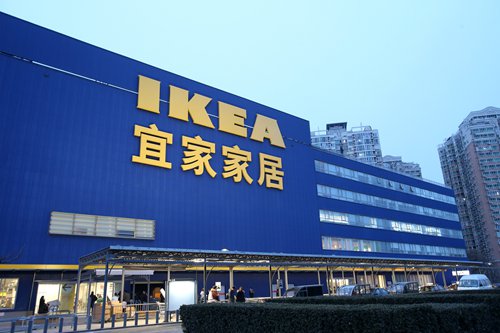
A Muji store in China. File photo: VCG
A dozen products from MUJI (Shanghai) Co Ltd and Swedish retailer IKEA have been removed from shelves or had their information modified on Thursday, a day after Beijing's market quality watchdog listed their products as substandard.
The watchdog on Wednesday notified 11 unqualified furniture samples in Beijing, including six from MUJI and two from IKEA, and sellers of substandard goods have been punished.
The substandard MUJI products include beech hangers, dining tables, walnut chairs and others, with the main reason being a mismatch of their nominal materials with actual materials, according to a report released by Beijing's market regulation bureau.
For example, three MUJI products marked as "walnut" goods are actually made of "black walnut" or "plywood."

Pictured is the front of an Ikea store in Beijing on January 7, 2018. Photo: IC
IKEA's unqualified products include children's wardrobe cabinets, as the front panel of drawers might hurt their fingers during use, the report said.
The report added that the watchdog has asked that other unqualified goods of the same model be removed as well.
"We have modified the commodity name based on Chinese national standards," according to a statement sent to the Global Times by MUJI (Shanghai) on Thursday.
An IKEA public relations officer told the Global Times that sales of related products have been suspended since March and customers who had bought them can apply for refund.
"We will enhance the management of commodity information based on China's national standards," said MUJI's statement.
Global Times reporters did not find any products listed as "substandard" by the authorities while visiting a MUJI direct-sales store in Chaoyang district in Beijing on Thursday.
One of the only pieces of furniture left in the MUJI store is a wooden double bed with multiple signs on it saying "sold." A label attached to the headboard of the bed noted that it is a white oak headboard, but the information showed it was made of fiberboard and plywood.
"Given that China is stepping up efforts to improve its business environment, dishonest manufacturers will be punished to foster fair competition," Hong Tao, a professor at Beijing Technology and Business University, told the Global Times on Thursday.
Authentic product labeling is a primary step to protecting consumers' rights and interests, Hong said.
"The furniture's material is one of the most important considerations. I would choose shops which specialize in furniture instead of MUJI," a customer at the store told the Global Times on Thursday.
"I usually buy stationary and articles for daily use at MUJI, but there's no need to buy furniture there because of their poor cost-effectiveness," Hong Jing, who claims to have bought many MUJI products, told the Global Times on Thursday.
